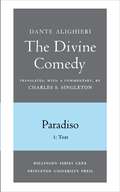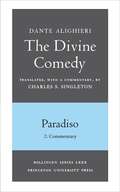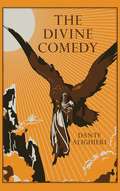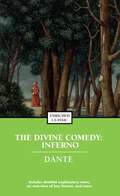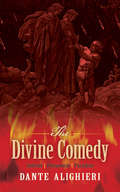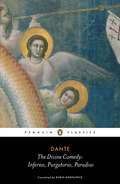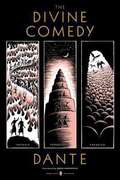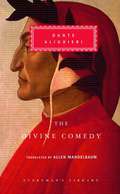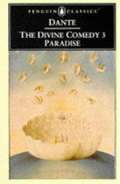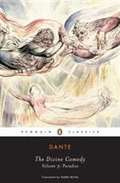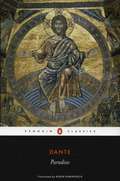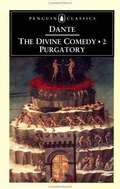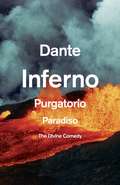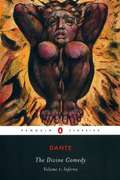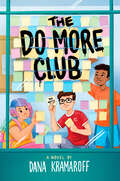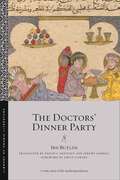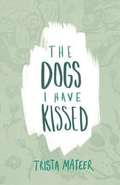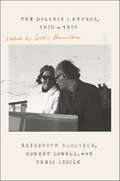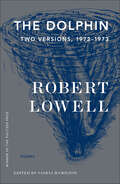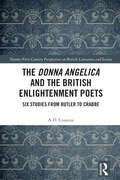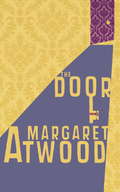- Table View
- List View
The Divine Comedy, III. Paradiso, Vol. III. Part 1: 1: Italian Text and Translation; 2: Commentary (Bollingen Series #678)
by DanteContinuing the paperback edition of Charles S. Singleton's translation of The Divine Comedy, this work provides the English-speaking reader with everything he needs to read and understand the Paradiso. This volume consists of the prose translation of Giorgio Petrocchi's Italian text (which faces the translation on each page); its companion volume of commentary is a masterpiece of erudition, offering a wide range of information on such subjects as Dante's vocabulary, his characters, and the historical sources of incidents in the poem. Professor Singleton provides a clear and profound analysis of the poem's basic allegory, and the illustrations, diagrams, and map clarify points that have previously confused readers of The Divine Comedy.
The Divine Comedy, III. Paradiso, Vol. III. Part 2: Commentary (The Divine Comedy #6)
by DanteContinuing the paperback edition of Charles S. Singleton's translation of The Divine Comedy, this work provides the English-speaking reader with everything he needs to read and understand the Paradiso. This volume consists of the prose translation of Giorgio Petrocchi's Italian text (which faces the translation on each page); its companion volume of commentary is a masterpiece of erudition, offering a wide range of information on such subjects as Dante's vocabulary, his characters, and the historical sources of incidents in the poem. Professor Singleton provides a clear and profound analysis of the poem's basic allegory, and the illustrations, diagrams, and map clarify points that have previously confused readers of The Divine Comedy.
The Divine Comedy: Iii Paradise (Leather-bound Classics)
by Dante Alighieri Paul Gustave DoreInferno, Purgatorio, and Paradiso -- the three fates of the deceased become the three pillars of an epic poem. The Divine Comedy, written by Italian poet Dante Alighieri in the fourteenth century, is considered the foremost work in Italian literature. The journey begins with Dante's descent into the depths of Hell where he witnesses those eternally separated from God. Then he climbs the mountain of Purgatory where Christian souls undergo final purification, before finally touring the celestial circles of Heaven where he is filled with the image of God. An allegorical work, the comedy is representative of the soul's journey towards God.Influential for seven centuries, this classic is a must have for lovers of great literature, and the luxurious leather-bound edition from Canterbury Classics will make a stunning addition to any library.
The Divine Comedy: Inferno (Enriched Classics #2)
by DanteENDURING LITERATURE ILLUMINATED BY PRACTICAL SCHOLARSHIP The first volume of The Divine Comedy--Dante begins his downward journey through the seven circles of Hell. EACH ENRICHED CLASSIC EDITION INCLUDES: A concise introduction that gives readers important background information A chronology of the author's life and work A timeline of significant events that provides the book's historical context An outline of key themes and plot points to help readers form their own interpretations Detailed explanatory notes Critical analysis, including contemporary and modern perspectives on the work Discussion questions to promote lively classroom and book group interaction A list of recommended related books and films to broaden the reader's experience Enriched Classics offer readers affordable editions of great works of literature enhanced by helpful notes and insightful commentary. The scholarship provided in Enriched Classics enables readers to appreciate, understand, and enjoy the world's finest books to their full potential. SERIES EDITED BY CYNTHIA BRANTLEY JOHNSON
The Divine Comedy: Inferno, Purgatorio, Paradiso
by Dante Alighieri Henry Wadsworth LongfellowThis convenient single-volume edition contains all three parts of Dante's 14th-century poem ― Inferno, Purgatorio, and Paradiso ― in an acclaimed translation by American poet Henry Wadsworth Longfellow. Combining classical and Christian history as well as medieval politics and religion, this trilogy of sublime verse is among Western civilization's most important artistic works and essential reading for students of literature and history. Dante's allegory of the soul's journey to God begins with Inferno, in which the narrator traverses the underworld in the company of the ancient Roman poet Virgil. As they travel through the nine circles of Hell, the poets encounter historical and mythological figures suffering symbolic punishments for their earthly crimes. In Purgatorio, Dante continues on alone through the realm of redemption, where departed souls reflect upon their sins and work toward their moral improvement. The tale culminates in Paradiso, where the divine Beatrice guides Dante in the final stage of his intellectual journey from doubt to faith.
The Divine Comedy: Inferno, Purgatorio, Paradiso (Landmarks Of World Literature (new) Ser.)
by Dante AlighieriRobin Kirkpatrick's masterful verse translation of The Divine Comedy, published in a single volume, is the ideal edition for students as well as the general reader coming to this great masterpiece of Italian literature for the first timeThe Divine Comedy describes Dante's descent into Hell with Virgil as a guide; his ascent of Mount Purgatory and encounter with his dead love, Beatrice; and finally, his arrival in Heaven. Examining questions of faith, desire and enlightenment, the poem is a brilliantly nuanced and moving allegory of human redemption.This volume includes a new introduction, notes, maps and diagrams 'The perfect balance of tightness and colloquialism... likely to be the best modern version of Dante' - Bernard O'Donoghue'The most moving lines literature has achieved' - Jorge Luis Borges'This version is the first to bring together poetry and scholarship in the very body of the translation - a deeply-informed version of Dante that is also a pleasure to read' - Professor David Wallace, University of PennsylvaniaIndividual editions of Robin Kirkpatrick's translation - Inferno, Purgatorio and Paradiso - are also available in Penguin Classics, and include Dante's Italian printed alongside the English text.
The Divine Comedy: Inferno, Purgatorio, Paradiso (Penguin Classics Deluxe Edition) (Penguin Classics Deluxe Edition)
by Dante AlighieriPurchase of this book includes free trial access to www. million-books. com where you can read more than a million books for free. This is an OCR edition with typos. Excerpt from book: CANTO II Dante prepares for his journey. The Muses are invoked. Dante is haunted vrith misgivings. Vergil rebukes his cowardice, and relates how Beatrice visited him in Limbo, and sent him to Dante's aid. Dante declares himself encouraged and ready to set out. Day was departing, and the dusky air Releasing from their toils the animals Which are on earth; and I, all, all alone, Prepared myself to undergo the stress Both of the journey and the suffering, Which memory that errs not shall portray. Now Muses, aid me Lofty genius, aid 0 Memory, who hast written what I saw, Here shall thy nobleness be manifest. 10 I thus began: Poet, who guidest me, Consider well my power if it suffice, Ere thou commit me to the arduous road. Thou sayest Silvius' father, mortal still, Went to the world immortal, and was there Bodily-wise. If gracious then to him The Adversary of all evil was, ? Considering the great result, from him Destined to issue, and the who and what, ? This, to a man of understanding, seems 20 Not unbefitting; for of sacred Rome And of her empire, he, in highest Heaven, Was chosen to be father; both of which, To say the truth, were for the holy place Decreed, where he who the successor is Of greater Peter, sits. Things which the cause Were of his triumph and the papal robe, He learned upon that journey, for the which Thou dost extol him. Thither, afterward, The 'chosen vessel' went, to bring back thence 30 A confirmation to that faith wherein Salvation's way begins. But as to me, Why go I thither, or who suffers it? Aeneas I am not, nor am I Paul: Worthy of this nor I nor others deem me. And therefore, if I yield myself to go, I fear my going may be folly. Thou Art wise, and kn.
The Divine Comedy: Inferno; Purgatorio; Paradiso
by Dante Alighieri Eugenio Montale Allen Mandelbaum Peter ArmourThe Divine Comedy, translated by Allen Mandelbaum, begins in a shadowed forest on Good Friday in the year 1300. It proceeds on a journey that, in its intense recreation of the depths and the heights of human experience, has become the key with which Western civilization has sought to unlock the mystery of its own identity. <p><p> Mandelbaum's astonishingly Dantean translation, which captures so much of the life of the original, renders whole for us the masterpiece of that genius whom our greatest poets have recognized as a central model for all poets. <p> This Everyman's edition-containing in one volume all three cantos, Inferno, Purgatorio, and Paradiso-includes an introduction by Nobel Prize--winning poet Eugenio Montale, a chronology, notes, and a bibliography. Also included are forty-two drawings selected from Botticelli's marvelous late-fifteenth-century series of illustrations.
The Divine Comedy: Paradise
by Dante AlighieriIn Paradise, having plunged to the uttermost depths of Hell and climbed the Mount of Purgatory, Dante ascends to Heaven, continuing his soul's search for God, guided by his beloved Beatrice. As he progresses through the spheres of Paradise he grows in understanding, until he finally experiences divine love in the radiant presence of the deity. Examining eternal questions of faith, desire and enlightenment, Dante exercised all his learning and wit, wrath and tenderness in his creation of one of the greatest of all Christian allegories. Translation is by Dorothy L. Sayers, completed and introduced by Barbara Reynolds.
The Divine Comedy: Paradise (Classics #3)
by Dante Alighieri Mark MusaThis splendid verse translation by Allen Mandelbaum provides an entirely fresh experience of Dante's great poem of penance and hope. As Dante ascends the Mount of Purgatory toward the Earthly Paradise and his beloved Beatrice, through "that second kingdom in which the human soul is cleansed of sin, " all the passion and suffering, poetry and philosophy are rendered with the immediacy of a poet of our own age. With extensive notes and commentary prepared especially for this edition.
The Divine Comedy: Paradiso (Volume #3)
by Dante Alighieri Robin KirkpatrickHaving plunged to the utmost depths of Hell and climbed Mount Purgatory in the first two parts of The Divine Comedy, Dante now ascends to Heaven, guided by his beloved Beatrice, to continue his search for God.
The Divine Comedy: Purgatory
by Dante AlighieriBeginning with Dante's liberation from Hell, Purgatory relates his ascent, accompanied by Virgil, of the Mount of Purgatory - a mountain of nine levels, formed from rock forced upwards when God threw Satan into depths of the earth. As he travels through the first seven levels, Dante observes the sinners who are waiting for their release into Paradise, and through these encounters he is himself transformed into a stronger and better man. For it is only when he has learned from each of these levels that he can ascend to the gateway to Heaven: the Garden of Eden. The second part of one of the greatest epic poems, Purgatory is an enthralling Christian allegory of sin, redemption and ultimate enlightenment.
The Divine Comedy: The Unabridged Classic (Vintage Classics)
by Dante AlighieriDante's Divine Comedy relates the allegorical tale of the poet's journey through the three realms of the dead. Accompanied through the Inferno and Purgatory by Virgil--author of the Roman epic the Aeniad--Dante encounters mythical, historical, and contemporaneous figures in their respective afterlives. Relying on classical (pagan) mythology and Christian imagery and theology, Dante imagines diverse vivid and inventive punishments for the various sinners he encounters, which have become part of the Western imagination. Upon their approach to Paradise, which as a pagan, no matter how worthy, the Latin poet cannot enter, Virgil relinquishes his role as guide to Beatrice. Dante's chaste beloved then accompanies him along the ascent, as they encounter the blessed and the holy, and Dante arrives at a vision of the heavenly paradise.
The Divine Comedy: Volume 1, Inferno
by Dante Alighieri Mark MusaThe most famous of the three canticles that comprise "The Divine Comedy, Inferno" describes Dante's descent in Hell midway through his life, with Virgil as a guide. As he descends through nine concentric circles of increasingly agonizing torture, Dante encounters doomed souls that include the pagan Aeneas, the liar Odysseus, the suicidal Cleopatra, and his own political enemies, damned for their deceit. Led by leering demons, Dante must ultimately journey with Virgil to the deepest level of all for it is only by encountering Satan himself, in the heart of Hell, that he can truly understand the tragedy of sin.
The Do More Club
by Dana KramaroffA Jewish boy&’s bravery and kindness are tested after an antisemitic attack on his middle school in this rousing novel-in-verse.Ever since twelve-year-old Josh Kline found an antisemitic note in his family&’s mailbox in third grade, he has felt uncomfortable about his Jewish identity. At a new school where he&’s pretty sure he&’s the only Jew, he&’s hoping to just keep religion out of everything . . . until the morning someone sprays swastikas all over the building. That&’s when everything changes.In one of the school counseling groups set up in response to the attack, Josh finally reveals that he is Jewish, and quickly finds out there&’s more to the other kids in his grade too: All of them have their own struggles. Maybe Josh can do something to help—to &“repair the world&” as his rabbi teaches, by starting a Do More club to spread kindness. But making a difference is never simple, even when you have new friends by your side.Fast-paced and conversation-starting, Josh&’s story is an empowering examination of prejudice, bullying, and how to take the first step toward change.
The Doctors' Dinner Party (Library of Arabic Literature #85)
by Ibn BuṭlānA witty satire of the medical professionThe Doctors’ Dinner Party is an eleventh-century satire in the form of a novella, set in a medical milieu. A young doctor from out of town is invited to dinner with a group of older medical men, whose conversation reveals their incompetence. Written by the accomplished physician Ibn Buṭlān, the work satirizes the hypocrisy of quack doctors while displaying Ibn Buṭlān’s own deep technical knowledge of medical practice, including surgery, blood-letting, and medicines. He also makes reference to the great thinkers and physicians of the ancient world, including Hippocrates, Galen, and Socrates. Combining literary parody with social satire, the book is richly textured and carefully organized: in addition to the use of the question-and-answer format associated with technical literature, it is replete with verse and subtexts that hint at the infatuation of the elderly practitioners with their young guest. The Doctors’ Dinner Party is an entertaining read in which the author skewers the pretensions of the physicians around the table.An English-only edition.
The Dogs I Have Kissed
by Trista MateerWinner of the 2015 Goodreads Choice Award, The Dogs I Have Kissed is a collection of poetry about kissing the wrong people and sometimes just being the wrong person. It's a story about leaving until you learn how to stay. Known for her eponymous blog and her confessional style of writing, this is Trista Mateer's second collection of poetry.
The Dolphin Letters, 1970–1979: Elizabeth Hardwick, Robert Lowell, and Their Circle
by Elizabeth Hardwick, Robert Lowell and Saskia HamiltonThe correspondence between one of the most famous couples of twentieth-century literatureThe Dolphin Letters offers an unprecedented portrait of Robert Lowell and Elizabeth Hardwick during the last seven years of Lowell’s life (1970 to 1977), a time of personal crisis and creative innovation for both writers. Centered on the letters they exchanged with each other and with other members of their circle—writers, intellectuals, friends, and publishers, including Elizabeth Bishop, Caroline Blackwood, Mary McCarthy, and Adrienne Rich—the book has the narrative sweep of a novel, telling the story of the dramatic breakup of their twenty-one-year marriage and their extraordinary, but late, reconciliation.Lowell’s controversial sonnet-sequence The Dolphin (for which he used Hardwick’s letters as a source) and his last book, Day by Day, were written during this period, as were Hardwick’s influential books Seduction and Betrayal: Essays on Women in Literature and Sleepless Nights: A Novel. Lowell and Hardwick are acutely intelligent observers of marriages, children, and friends, and of the feelings that their personal crises gave rise to.The Dolphin Letters, masterfully edited by Saskia Hamilton, is a debate about the limits of art—what occasions a work of art, what moral and artistic license artists have to make use of their lives as material, what formal innovations such debates give rise to. The crisis of Lowell’s The Dolphin was profoundly affecting to everyone surrounding him, and Bishop’s warning to Lowell—“art just isn’t worth that much”—haunts.
The Dolphin: Two Versions, 1972–1973: Poems
by Robert LowellI have sat and listened to too manywords of the collaborating muse,and plotted perhaps too freely with my life,not avoiding injury to others,not avoiding injury to myself—to ask compassion . . . this book, half fiction,an eelnet made by man for the eel fightingmy eyes have seen what my hand did.Winner of the 1974 Pulitzer Prize in Poetry, The Dolphin was controversial from the beginning: many of the poems include the letters that Robert Lowell’s wife, the celebrated writer and critic Elizabeth Hardwick, wrote to him after he left her for the English socialite and writer Caroline Blackwood. He was warned by many, among them Elizabeth Bishop, that “art just isn’t worth that much.” Nevertheless, these poems are a powerful document of an impulsive love, and a moving record of Lowell’s change from one life and marriage in America to a new life on new terms with a new family in England, rendered with the stunning technical power and control for which he was so celebrated. This new edition, which follows the 1973 edition, includes scans of the pages of Lowell’s original manuscript, giving us a look into the brilliant and complicated mind of one of our most beloved and distinguished poets.
The Donna Angelica and the British Enlightenment Poets: Six Studies from Butler to Crabbe (21st Century Perspectives on British Literature and Society)
by A.D. CousinsThe aim of the book is to propose new interpretations of poets who are among the most valued and discussed in the British Enlightenment. In fulfilling its aim, the book covers English poetry—and intellectual history—from the Restoration to the later eighteenth century. It examines how the myth of the donna angelica (the angelic lady), ancient in origin but given its best-known form within the medieval literature of fin’amor, lives on beyond the Middle Ages and the Renaissance into the Enlightenment. To be more precise, it studies how some major Augustan poets appropriate and recreate what, for convenience, can be called the donna angelica topos (or, the angelic lady motif). They do so for a great many reasons linked with quite diverse circumstances. Nevertheless, the myth’s intellectual richness, emotional intensity, and inherent ambiguities mean that it offers each of them a powerful way for articulating, interpreting, exploring refractions of eros—whether singly or diversely directed, concerned with sexuality or spirituality, informing personal or public experience. The myth has as many faces, so to speak, as does desire; it is one and yet many. Thus, the book pursues a particular fable of eros that appears in a multiplicity of texts in a multiplicity of guises. It studies how some of the most interesting poets from Dryden to Crabbe bring the angelic lady motif into modernity.
The Door
by Margaret AtwoodA stunning lyrical achievement and Atwood's first collection of new poems in over a decade.The Door is Margaret Atwood's first book of poetry since the award-winning Morning in the Burned House (1995). Its fifty lucid yet urgent poems range in tone from lyric to ironic to meditative to prophetic, and in subject from the personal to the political, viewed in its broadest sense. They investigate the mysterious writing of poetry itself, as well as the passage of time and our shared sense of mortality. The collection begins with poems that consider the past and ends with harbingers of things to come.Brave and compassionate, The Door interrogates the certainties that we build our lives on.From the Hardcover edition.
